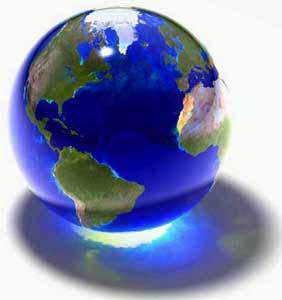 Somehow, nearly 20 years after the publication of 50 Simple Things You Can Do to Save the Earth, the fact that our everyday decisions can have an impact on the future of the planet is still news.
Somehow, nearly 20 years after the publication of 50 Simple Things You Can Do to Save the Earth, the fact that our everyday decisions can have an impact on the future of the planet is still news.
It's true: Every time you turn off that extra light, hang your clothes to dry, and choose to recycle those glass bottles, you're taking a big step in the right direction. This weekend, in the special Living Green issue of the Sunday magazine, The Boston Globe featured 84 ways you can help the planet, but they left off a few things. Here are three more steps you can take to protect the planet.
- DITCH THE ANTI-BACTERIAL HAND SOAP. Triclosan, the ingredient in antibacterial soap that kills microbes, ends up in our water sources, where it accumulates in the fatty tissue of animals. It may be a hormone disruptor and a carcinogen as well. Antibacterial soap doesn't offer any better protection than plain old soap and water, so why not skip it?
- SCRUTINIZE YOUR PERSONAL CARE PRODUCTS. Your shampoo, your deodorant, your toothpaste -- they all carry a hidden environmental impact. You can cut back on pollution in water and the pollution in you by reading the labels on your products and knowing which chemicals to avoid. Or, use Skin Deep to search for better products.
- WHENEVER POSSIBLE, CHOOSE ORGANIC. Okay, the Globe did mention this one briefly, under the heading "vote with your dollars." We think it's important enough to deserve its own directive. By supporting organic (and, when possible, local) agriculture, you're changing the cycle of demand. There are so many people buying rBGH free milk, for example, that Monsanto had to call in the big guns to try and stop it. Not only is organic healthier for the planet, but choosing organic produce and dairy products reduces your exposure to potentially harmful pesticides, antibiotics, and artificial hormones. Need to prioritize when it comes to organic fruits and veggies? Food News can help.
Okay, so they left some stuff out. They also included a lot of great information -- here are a few of our favorites:
REDUCE, THEN REUSE, THEN RECYCLE. Someday there will likely be a wide variety of packaging that can be composted or endlessly reused and recycled; until then, consuming less that's new, reusing anything you can, and recycling what's left are your best options.
CLEAN UP YOUR CLEANING PRODUCTS.Some conventional household cleaning products contain known and suspected carcinogens and hormone disrupters, and many can induce asthma and other respiratory illnesses.Want to know a little more about your options? Here are some suggestions from Women's Voices for the Earth.
PASS ON PARTICLEBOARD. Indoor air quality is affected by formaldehyde and other volatile organic compounds, or VOCs, found in carpeting, plywood, subflooring, paint, and furnishings. You don't have to remodel your entire house, but choose lower-VOC options going forward. Strong fumes are one indicator of harmful gases, but some products, including interior paints, indicate whether they are "low-VOC" on their packaging.
STOP HAND WASHING THE DISHES.The average energy-efficient dishwasher uses just 4 gallons per cycle, saving as much as 5,000 gallons of water per year compared with hand washing, as well as $40 in energy costs and 230 hours of washing time, according to the EPA.This one's a personal pet peeve of mine. I can't stand it when people insist on "just rinsing" the dishes before they put them in the dishwasher. More often than not, the dishes are practically clean before they're even loaded, and all that water savings goes down the drain. (Pardon the pun. Completely unintentional, I promise.)